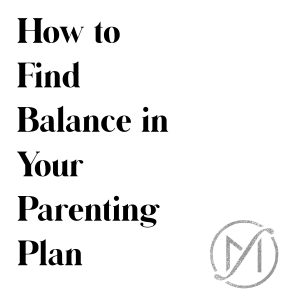How to Find Balance in Your Parenting Plan (aka Visitation Schedule)

Many people’s key top divorce priority is making a parenting plan that works for their family.
Read on to learn more.
Kids and Divorce
Divorce represents an opportunity for you to make positive changes in your life, and for your children, the experience can be full of a new set of emotions that require your energy and careful consideration. Even if you and your former spouse have been living separately for a while, children tend to see divorce as a transformation point. For them, it is final proof that their parents will not be getting back together, and questions will arise.
“How often will I see Dad (or Mom) now?”
“Does he (or she) still love us?”
This reaction is completely normal. The good news is that a well-balanced parenting plan (also called a visitation schedule) can provide your children with the stability they need and reassure them that both of their parents love them as much as ever. Here are ways that you can create a parenting plan that works for everyone and gives your children the structure they’re craving during this transitional time in their lives.
Read: What Does Child Visitation Mean?
How to Find Balance in Your Parenting Plan (aka Visitation Schedule)
- Establish Consistent Visitation Times
Children can be remarkably resilient, and to give them the support they need when faced with a major life change, like divorce, look to creating consistency and structure as your starting point. Work with your attorney and your former spouse to develop a visitation schedule that the children can easily anticipate and look forward to. When they know exactly which parent they’ll be staying with at any given time, their sense of security will quickly rebuild and their ability to cope with other external changes (like school, sports, and friends) will improve drastically.
- Consider the Children’s Ages
If your children are older, consider asking them how they would like to divide their time between both parents or, at the very least, letting them know what potential options are. As parents, you and your former spouse will have the final say, but soliciting their input and accommodating reasonable requests will give them a sense of ownership in their future living arrangements.
- Take the Children’s Activities Into Account
If your children have extracurricular activities, such as dance, soccer, or an after-school book club, try to create a schedule that allows them to maintain these commitments. Any arrangement that does not allow them sufficient time to enjoy sports, hobbies, and get-togethers with friends should be revisited to accommodate them as much as possible.
- Include Contingency Plans
Life can throw curveballs when you least expect it, and a good parenting plan should have contingencies in place. For example, what happens if a visit has to be canceled for some reason? Or if the custodial parent becomes ill on the day the children are due to come home? While flexibility is always good, having too few rules may leave you or your spouse without direction if an unexpected situation arises.
- Enable Virtual Visitation
Virtual visitation allows parents who live in a different city or even state to stay in touch with their children in between physical visits by using email, social media, video chat, and other telecommunication programs. If you or your spouse eventually relocate, this supplement to traditional visitation helps the non-custodial parent engage with the children despite the distance.
If you know that one parent is going to be moving in the near future, virtual visitation arrangements can be discussed and formalized during negotiations. If the move occurs later on, the parenting plan can be revisited and amended.
A reliable yet flexible parenting plan will meet the children’s changing needs while allowing you and your former spouse to share in their upbringing long after the divorce is final. At Freed Marcroft, we would be pleased to assist you in developing a visitation schedule that works for everyone while preserving the strength of the parent-child relationship. To speak to a team member and obtain assistance with creating a balanced parenting plan, START HERE.








